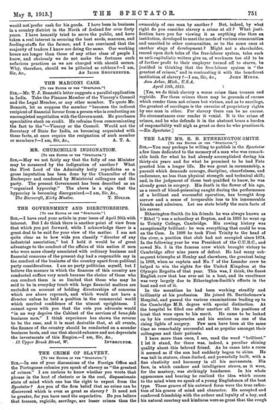THE CRIME OF SLAVERY.
[To THE EDITOR OF THE "SPECTATOR."] Sin,—In one of your discussions of the Foreign Office and the Portuguese colonies you speak of slavery as "the greatest of crimes." I am curious to know whether you wrote that phrase in the heat of rhetoric or in the cool, dispassionate state of mind which one has the right to expect from the Spectator? Are you of the firm belief that no crime can be discovered which is even as great as slavery ? It need not be greater, for you have used the superlative. Do you believe that treason, regicide, sacrilege, are lesser crimes than the
ownership of one man by another P But, indeed, by what right do you consider slavery a crime at all P What justi- fication have you for viewing it as anything else than an institution, developed to meet the needs of various communities and unsuited to other communities, or to the same ones at another stage of development P Might not a slaveholder, reared upon dark tales of the free-labour system, tales such as anti-capitalistic writers give us, of workmen too old to be of further profit to their employer turned off to starve, be justified in thinking that the free-labour system is " the greatest of crimes," and in contrasting it with the beneficent April 12th, 1913.
[Yes, we do think slavery a worse crime than treason and regicide. For these crimes there may be grounds of excuse which render them not crimes but virtues, and as to sacrilege, the greatest of sacrileges is the exercise of proprietary rights by one man in other. For slavery there can be no excuse. No circumstances ever render it venial. It is the crime of crimes, and he who defends it in the abstract bears a burden of responsibility well nigh as great as does he who practises it. —ED. Spectator.]


















































 Previous page
Previous page